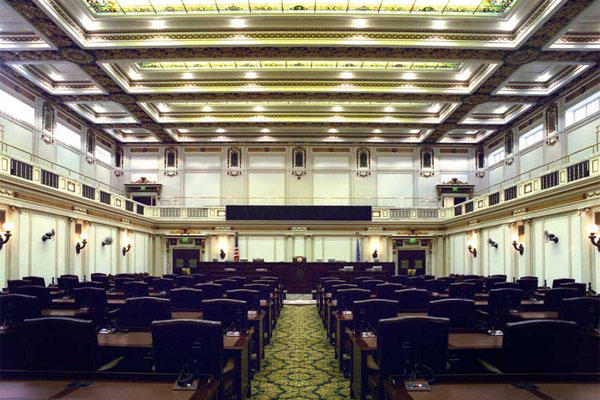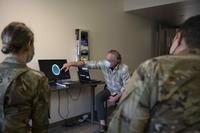 Military Update: A three-judge panel on the U.S. Court of Appeals for Veterans Claims has ruled unanimously that the Department of Veterans Affairs ignored “plain language” of a 2010 statute meant to protect VA-enrolled veterans from out-of-pocket costs when forced to use non-VA emergency medical care.
Military Update: A three-judge panel on the U.S. Court of Appeals for Veterans Claims has ruled unanimously that the Department of Veterans Affairs ignored “plain language” of a 2010 statute meant to protect VA-enrolled veterans from out-of-pocket costs when forced to use non-VA emergency medical care.
The panel ordered the Board of Veterans’ Appeals to vacate its decision to deny Air Force veteran Richard W. Staab roughly $48,000 in health care costs he was forced to pay following open-heart surgery in December 2010. The board “failed to properly apply the statute and relied on an invalid regulation” to deny Staab’s claim, the court ruled.
The decision benefits only Staab, for now. But hundreds of other VA-enrolled veterans who had alternative health insurance, and so got stuck paying some of their outside emergency care costs since Feb. 1, 2010, when the ignored law took effect, have new legal ground on which to re-file claims for VA reimbursement, said Bart Stichman, one of Staab’s attorneys.
These vets should cite the appeals courts’ April 8 Staab v. McDonald decision to argue “clear and unmistakable error” in deciding previous claims, said Stichman, forcing VA claim adjudicators to determine if there was error.
Stichman also is joint executive director of the National Veterans Legal Services Program, a nonprofit veterans service organization that brought Staab’s case to the appeals court as it often does on critical benefit issues.
The court, in effect, agreed Staab had been victimized by VA’s convoluted interpretation of a law regarding its obligation to cover non-VA emergency care costs when veterans have other health insurance, including Medicare.
VA long has maintained it is obligated to pay emergency costs only for veterans who have no alternative health coverage. The consequence of that logic is that VA-enrolled veterans are better off having no other insurance when a health emergency arises than in having some coverage.
For those without insurance, VA agrees it must cover all costs. For those with insurance, VA will cover no costs, forcing veterans to pay whatever expenses Medicare or their health insurance plans will not pay.
Recognizing how unfair that is, Congress voted in 2009 to clarify the law, specifically to “allow the VA to reimburse veterans for treatment in a non-VA facility if they have a third-party insurance that would pay a portion of the emergency care.”
To be sure colleagues understood the purpose of the change, Sen. Daniel Akaka, then-chairman of the Senate Veterans Affairs Committee, made a floor speech that it would “modify current law so that a veteran who has outside insurance would be eligible for reimbursement in the event that the outside insurance does not cover the full amount of the emergency care.”
The clarifying statute took effect in February 2010. Yet while rewriting regulations to implement the law, VA officials opted for language that would preserve their former interpretation. Reimbursements for emergency care would be allowed under the revised rule only if the “veteran has no coverage under a health-plan contract” for payment of such care.
In a notice of final rulemaking published April 20, 2012, VA reinforced the point, stating that any entitlement to care or services under an outside health plan, “even a partial one, bars eligibility” for VA reimbursement.
That was wrong, the appeals court found. The “plain language” of the revised statute, it wrote, shows Congress “intended VA to reimburse a veteran for that portion of expenses not covered by a health plan contract.”
Given the clear meaning, the appeals court deemed the 2012 regulation invalid and ordered it set aside. It also remanded Staab’s case to the appeals board to be re-adjudicated by “properly” applying the law.
Staab, 83, learned of the decision Monday.
“I thought it was great,” he said in a phone interview
A resident of St. Cloud, Minn., Staab only enrolled in VA care a decade ago after a foot and ankle injury sustained while offloading cargo in the Pacific in 1953 worsened. The VA rated him 30-percent disabled.
Staab suffered his 2010 heart attack while helping his wife, who had multiple sclerosis, out of their specially equipped van. He recalled being unable to catch his breath and agreed to get in an ambulance only if someone would tend to his wife. He had emergency heart surgery and soon also a stroke that would require a long rehabilitation. He was six months in hospital and nursing home, learning to speak again, as medical bills piled up.
Because Medicare Part A covered only a portion of the rising costs, Staab went home months sooner than his doctors had advised. He forwarded unpaid bills to VA but it denied payment, explaining that because Medicare had paid some of the cost, VA couldn’t cover what remained.
“I don’t think that made any sense,” Staab told me. He was forced to draw down his savings, but he did pay all his medical costs, what he estimated for the court totaled $48,000.
“That puts a lot of strain on you,” he recalled. His wife died last May.
Jacqueline M. Schuh, a former military attorney in St. Cloud, began to help Staab on a pro bono basis through three levels of administrative appeals. By the time the Board of Veterans’ Appeals rejected their case, Stichman and the NVLSP also were involved. Stichman said he has three other cases before the appeals court that, based on the precedence now set by the three-judge panel, are also likely to be decided for the veteran.
“They could have taken any of them but picked Staab first. It’s not uncommon that this [faulty regulation] is used as grounds for denial. As you can imagine, a lot of people are partly covered by some other insurance.”
“Partly our job is to try to get word out to veterans who were denied in the past on this ground that there is a pathway" to reimbursement, Stichman added. "It’s not a-100-percent-certain pathway. But if they file a claim challenging the previous denial based on clear and unmistakable error, then the VA is required to take a look…[T]here’s a very good argument that the regs were clear and unmistakably wrong, given the forcefulness of the court’s decision.”
“I hope it will help a lot of people,” Staab said.
The VA can appeal, Stichman said, but he suggested that would be an embarrassment for the department.
Send comments to Military Update, P.O. Box 231111, Centreville, VA, 20120, email milupdate@aol.com or twitter: Tom Philpott @Military_Update.
# # # #
Tom Philpott has been breaking news for and about military people since 1977. After service in the Coast Guard, and 17 years as a reporter and senior editor with Army Times Publishing Company, Tom launched "Military Update," his syndicated weekly news column, in 1994. "Military Update" features timely news and analysis on issues affecting active duty members, reservists, retirees and their families.
Visit Tom Philpott's Military Update Archive to view his past articles.
Tom also edits a reader reaction column, "Military Forum." The online "home" for both features is Military.com.
 Tom's freelance articles have appeared in numerous magazines including The New Yorker, Reader's Digest and Washingtonian.
Tom's freelance articles have appeared in numerous magazines including The New Yorker, Reader's Digest and Washingtonian.
His critically-acclaimed book, Glory Denied, on the extraordinary ordeal and heroism of Col. Floyd "Jim" Thompson, the longest-held prisoner of war in American history, is available in hardcover and paperback.




